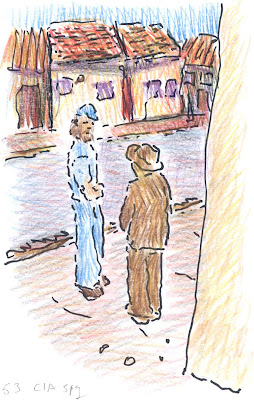
85.
Manaus, Brazil:
Manaus, Brazil:
As the plane circles for a landing, I can see that this is a big, modern city--but best of all to me is the white ocean-going ship I can see far below tied up and waiting at the city dock.
At the airport I give a disgusted taxi driver the last cash I have—an American dollar and some Peruvian change—for a short, fast ride to the dock. I still have a few traveler’s checks, but in my haste to reach the ship--which may be leaving momentarily-- I have not changed any of them into Brazilian currency.
The beautiful big white ship at the dock is the “Anna Nery”, a luxury cruiser bound for Rio de Janeiro.
They have a berth for me so for the last thousand miles or so of the Amazon, I’ll enjoy excellent food, private stateroom with shower, stewards, swimming pool and all the accouterments of la dulce vita. No problem--the purser cashes a traveler's check and for only ten times the cost of the first thousand miles I get the royal works.
What a fantastic bargain!
I dress in my only surviving jeans and shirt--hoping to be mistaken for an eccentric American millionaire--and amble to the dining salon feeling mighty like a king.
The chief steward places me at a table of English-speaking Brazilians so I will feel more comfortable. Dr. Jose, an M.D. from Sao Paulo, welcomes the eccentric American millionaire to his table with a gift of several small aquamarines from Minas Gerais. The good doctor’s charming wife and lovely daughter chat with me politely in flawless English.
The chinaware! The silverware!! The food!!! A couple of days ago I was practically fighting for my life, eating slop, sleeping flat on a steel deck, tormented by mosquitoes--and now I am in the very Womb of Luxury!
These changes are doing something to my head!
...




































